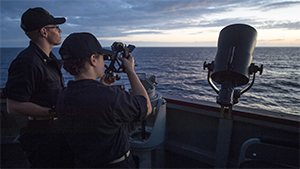The U.S. Merchant Marine Academy (USMMA) was granted full reaccreditation in November following warnings from academic overseers about sexual harassment and proper governance, and the suspension of the school’s Sea Year program for cadets.
The accreditation review board, the Middle States Commission on Higher Education (MSCHE), conducted its preliminary assessment of the academy in 2016. USMMA, the first of the federal service academies to be at risk of losing its accreditation, was warned by MSCHE that it had until June 2018 to meet the board’s terms of compliance.
The 2016 report described the institution as harboring a male-dominated culture and sexist attitudes both on campus and during mandatory training at sea. The board cited “insufficient and ineffective” efforts by USMMA officials and among students to prevent illicit behavior including sexual harassment and sexual assault, and it noted “the pervasiveness of the incidents is perceived as undeniable and disturbing.”
In reaction to the report, Transportation Secretary Anthony Foxx temporarily suspended the academy’s Sea Year program in June 2016, recalling more than 100 cadets already on assignment.
Often referred to simply as Kings Point, USMMA was established in 1943 and in 1974 it become the first military academy to admit women. A review of public records since that time revealed a disturbing pattern of reported cases of sexual assault and sexual harassment.
The National Defense Authorization Act of 2009 first addressed the problem by mandating biennial surveys of the academy to determine changes in the cultural climate requiring congressional reforms. In 2010, a government-contracted firm conducted the first investigative survey, which revealed reluctance among cadets to report incidents for fear of being subjected to retaliation.
In 2012, as many as 25 academy midshipmen came forward anonymously with reports of being sexually assaulted. As a result, the Department of Transportation conducted an anonymous survey in October 2014, with participants revealing that they felt subjected to the academy’s male-dominated culture, “victim blaming” and sexist attitudes.
In October 2016, it was announced the government had hired Logistics Management Institute (LMI) of Virginia to conduct the most recent set of confidential surveys to “assess the history, culture and climate of USMMA.” The resulting 138-page report, made public in December 2016, said the school continued to struggle with a climate where a “lack of trust and a culture of fear” deter students from alerting authorities about incidents of sexual assault or harassment. The document reiterated the need for reforms and recommended that USMMA develop a multiyear plan to achieve “mutual respect and zero tolerance” for sexual assault and harassment.
In October 2016, Sen. Kirsten Gillibrand, D-N.Y., proposed legislation to change the way sexual assault and sexual harassment crimes are handled at USMMA. The measure would “remove the decision to try cases of alleged sexual misconduct from the armed forces and allow cases to be tried by an independent prosecutor.” The Maritime Administration (MarAd) and academy officials declined to comment on the proposal.
The 2017 National Defense Authorization Act, signed in December 2016 by President Barack Obama, included new initiatives to improve training to prevent sexual assault and harassment and improve the processes for reporting and resolving such incidents at USMMA. The act included measures to ensure that the academy continue to fill key positions relating to sexual assault; establish training requirements for sexual assault advocates who work with students; and form a “working group” responsible for setting guidelines to combat misconduct. The legislation also required the inspector general’s office to audit the academy’s efforts.
Following a visit by the commission in September, MSCHE reaccredited the academy on Nov. 16, citing its compliance to standards on all fronts. Upon learning of the decision, MarAd Administrator Mark Buzby issued a statement about his alma mater that read, in part, “the success of the academy at every level” has been among his “highest priorities.” The reaccreditation, he wrote, “is confirmation that (USMMA) is getting back on course for providing a world-class educational experience to our future leaders.”
In its final report, the commission stated that the academy “is to be commended for the significant effort devoted to responding to the Middle States concerns, and for the many accomplishments implemented in the relatively short time frame spanning only three months.”
MSCHE recommended that the academy continue to work on strengthening its strategic plan and promoting institutional transparency, and provide an update on its progress by Sept. 1, 2018. The academy’s next accreditation evaluation by the commission is scheduled for the 2024-25 academic year.

